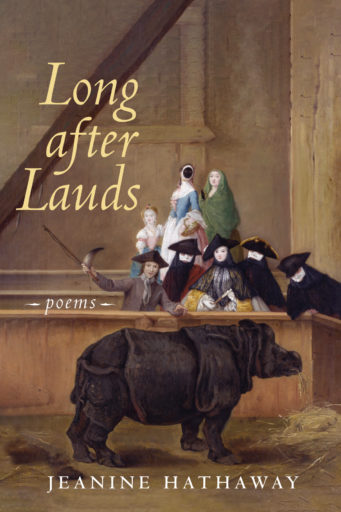

A little more than two thousand years ago, the Roman poet Virgil wrote his Georgics, a long poetic sequence about agriculture, suffused with profound reflections on the relationship between humanity, nature, and the divine—and reflecting the political turmoil of his times. California poet Karen An-hwei Lee, inspired by Virgil, has created her own dense, richly-layered […]
| Hardcover | ISBN 9781639820917 | $29.00 |
| Paperback | ISBN 9781639820900 | $16.00 |
| eBook | ISBN 9781639820924 | $12.99 |
A little more than two thousand years ago, the Roman poet Virgil wrote his Georgics, a long poetic sequence about agriculture, suffused with profound reflections on the relationship between humanity, nature, and the divine—and reflecting the political turmoil of his times.
California poet Karen An-hwei Lee, inspired by Virgil, has created her own dense, richly-layered collection of “Neo-Georgics,” constituting an extended exploration of such motifs as happiness, olive groves, vineyards, soil chemistries, the seacoast, and the birth of trees.
In Lee’s contemporary rendering we confront an environment blighted by our carbon footprint; advancements in agricultural technology and genetic engineering; the digital age; fossil fuel transportation; and vanishing bees.
Rose Is a Verb explores the ancient tradition of agrarian labor, including tilling the soil and interpreting weather signs and war omens. The poems flash with verbal ingenuity and mind-bending allusions—challenging the heart and mind but repaying slow, careful readings many times over. A meditation on the natural environment, this collection serves as a biomythography of procreation and a reflection on the meaning of happiness.
If poetry aspires to the condition of music, Karen An-hwei Lee’s magnificent poems begin there. Lee returns us to the sources of the lyric—song, praise, prayer, and lament—and gives new life to old forms. In the midst of such an innovative poetry, such a radical experimentation, what a surprise it is to find this kind and confident guide to take us on this journey. I cannot resist her pure and radiant voice, cannot help but follow where she leads
Eric Pankey, author of Owl of Minerva
Part heuristic creed, part Book of Hours breviary, these ‘georgics’ for our imperiled planet, and, by extension, our imperiled souls—these primordial poem-prayers—speak in, from, and into a language that is less a human possession and more an articulation of the animate earth itself. Toggling with agile and prodigious intelligence and passion among mathematics, science, theology, mythology, color theory, and genetics, she italicizes our particular human culpability in matters of sexism, racism, ageism, and especially ecology.
Lisa Russ Spaar, author of Orexia
“Similar to the inclusion of myths with invocations to Greek and Italian gods in Virgil’s Georgics, Karen An-hwei Lee’s Rose Is a Verb: Neo-Georgics makes allegorical requests for the biblical Jacob’s shrewd husbandry when she writes, ‘Teach us to strip fresh-cut branches of alba poplar, / . . . where herds come to drink,’ so that ‘future generations’ will be ‘streaked and spotted as figurative grains or stars.’ The everblooming lexicon throughout Rose Is a Verb is itself mimetic of Virgil’s symbolic bugonia—order and birth out of chaos and death, where even the most abstract of Lee’s language seems somehow imbued with revelation from the persona of her poetic sage.
Claude Wilkinson, author of World Without End
In this new millennium, the need for instructions on how to live is as essential as it was in our prehistory. Once again Karen An-hwei Lee reinvigorates the language with her reexamination of the Georgic mode with her Neo-Georgics—she poses essential questions about who we are and what we offer to the world. These incredible hybrid poems explore the physical and the divine, beckoning the reader to come to a knowledge that is both understanding and ecstatic. Rose Is a Verb is the kind of breathtaking inquiry necessary for us in a time of ultimate questions.
Oliver de la Paz, author of The Boy in the Labyrinth